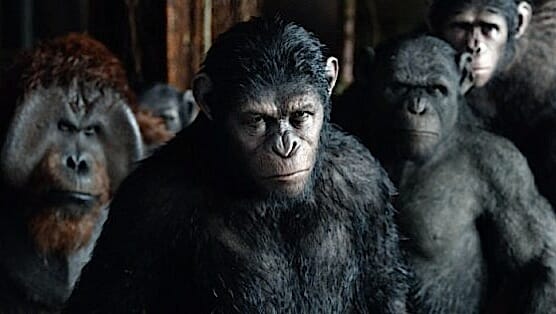Dawn of the Planet of the Apes

Dawn of the Planet of the Apes arrives with the unfortunate disadvantage of high expectations. That certainly wasn’t the case for its predecessor, Rise of the Planet of the Apes, which landed in 2011 with an iffy early August release date, relatively late screenings for critics and the residual ill will induced by Tim Burton’s botched 2001 reboot, Planet of the Apes. As it turned out, not only did Rise have nothing in common with Burton’s vision, it was a surprisingly thoughtful, well-crafted and genuinely exciting example of the Hollywood blockbuster.
Dawn, by contrast, opens amid a tidal wave of hype and positive buzz from early screenings. It has already been designated one of the biggest movies of the summer, and smartly positioned as an ideal remedy for the depressing hangover of the latest Transformers debacle. And in many ways, this confident, compassionate, visual spectacle made with good taste and good intentions is everything we should all expect from the highest caliber of Hollywood filmmaking. Except in the ways that it isn’t.
Dawn is a beautifully designed mixed bag. A step forward from Rise in several areas, and a step back in others. It’s a good film, and if you enjoy action or sci-fi movies or keeping up with the latest advances in “How the hell did they pull that off?” visual effects, you should definitely see it. But in comparison to the fun and surprises of Rise, Dawn can’t help but feel a little self-serious and predictable. It’s a parable that strives to be an epic. Ascendant director Matt Reeves (Cloverfield, Let Me In) evidently has the ambition to equal The Empire Strikes Back or The Dark Knight when it comes to genre sequels, and even though the film falls considerably short of those lofty goals, you can’t fault him for trying.
Set roughly a decade after the events of Rise, heroic chimp Caesar (Andy Serkis, reprising his justly lauded performance-capture role) has established an Ewok-style primate paradise in the lush forests outside San Francisco. It’s an apparent utopia where the golden rule is “ape do not harm ape,” communication happens via sign language and the existence of humans, largely wiped off the planet by the virus introduced in Rise, is a distant memory. For some, that memory is more of a nightmare—including Caesar’s longtime frenemy Koba (Toby Kebbell), who has never been able to forgive the evils inflicted upon him in human captivity.
-

-

-

-

-

-

-

-

-

-

-

-

-

-

-

-

-

-

-

-

-

-

-

-

-

-

-

-

-

-

-

-

-

-

-

-

-

-

-

-








































